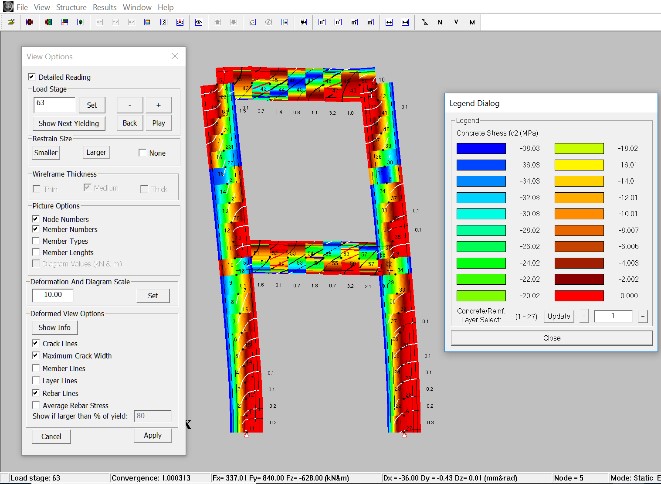VecTor5
VecTor5 is a nonlinear modeling software for the analysis of plane frames consisting of beams, columns and shear walls, subjected to quasi-static (monotonic, cyclic and reversed-cyclic). dynamic (seismic, impact and blast), and thermal loads. Pre-processor FormWorks+ allows users to create their analysis models in a graphical environment, while program Janus displays the analysis results in a user-friendly manner including deflected shapes, crack patterns, concrete and rebar stresses, failure modes, and so on.
VecTor5 is extensively validated with large-scale experimental tests. 13 journal papers are published, summarizing the results – see the next page. Considering 151 large-scale experimental specimen simulations, an average of 1.00 and a coefficient of variation of 11.6% is achieved for the predicted-to-experimental nominal strength ratios.
VecTor5 allows the analysis of frames with unusual or complex cross-sections and considers many second-order mechanisms to accurately represent the behaviour of cracked concrete. The compression softening due to transverse cracking, tension stiffening, shear slip along crack surfaces and out-of-plane confinement and expansion effects are explicitly considered. Displacement-controlled mode allows an analysis to continue after the peak, capturing the post-peak response and the displacement ductility.
The deep beam element (Liu et al. 2019) allows combining traditional frame elements with deep beam elements to account for failures and post-peak behaviors associated with complex shear failures. The deep beam element uses a three-parameter kinematic model (Liu and Mihaylov 2018) based on the behavior of two fans and a critical shear crack.
The default RDM material model (Akkaya et al. 2019) enables capturing the buckling response of reinforcing bars in concrete members while accounting for the interactions between the lateral ties and longitudinal bars. This model is capable of simulating the onset of inelastic buckling and subsequent degradation in the post-buckling region.
VecTor5 employs a distributed-plasticity, layered section approach, and an iterative, total-load, secant-stiffness formulation. The nonlinear sectional analyses provide a comprehensive and accurate representation of the concrete response, including the shear effects coupled with axial and flexural responses based on the Modified Compression Field Theory (Vecchio and Collins 1986) and the Disturbed Stress Field Model (Vecchio 2000).
Nonlinear dynamic analysis algorithms employ an explicit three-parameter time integration method, allowing the use of Newmark's average or linear acceleration, or Wilson's theta methods. The effects of high strain rates on the material behavior are accounted for. Structural damping is provided by the nonlinear concrete and reinforcement hysteresis models (Guner and Vecchio 2011).

Nonlinear dynamic analysis algorithms employ an explicit three-parameter time integration method, allowing the use of Newmark’s average or linear acceleration, or Wilson’s theta methods. The effects of high strain rates on the material behavior are accounted for. Structural damping is provided by the nonlinear concrete and reinforcement hysteresis models (Guner & Vecchio 2011).
| Premium | Basic | |
|---|---|---|
| Capacities | ||
| Frame Members | 2,000 | 10 |
| Nodes | 2,000 | 10 |
| Members Types | 50 | 2 |
| Concrete Layers | 50 | 20 |
| Reinforcement Layers | 50 | 3 |
| Material Types | ||
| Concrete layers | ||
| Steel bars (truss bar or smeared) | ||
| Deep beam elements (monotonic load) | ||
| Reinforcement Material Types | ||
| Steel, Prestressing Steel | ||
| Load Types | ||
| Static Forces | ||
| Static Displacements | ||
| Prestrains | ||
| Impact & Blast Forces | ||
| Ground Accelerations | ||
| Termal / Heat Flow | ||
| Analysis Modes | ||
| Static Nonlinear – Load Step | ||
| Static Nonlinear – Time Step | ||
| Dynamic Nonlinear – General | ||
| Dynamic Nonlinear – EQ Record | ||
| Dynamic Nonlinear – Impulse | ||
| Material Models | ||
| Full Range of Models | ||
| Default Models Only |
*Basic version not to be used for commercial purposes
Contact: vectoranalysisgroup@outlook.com